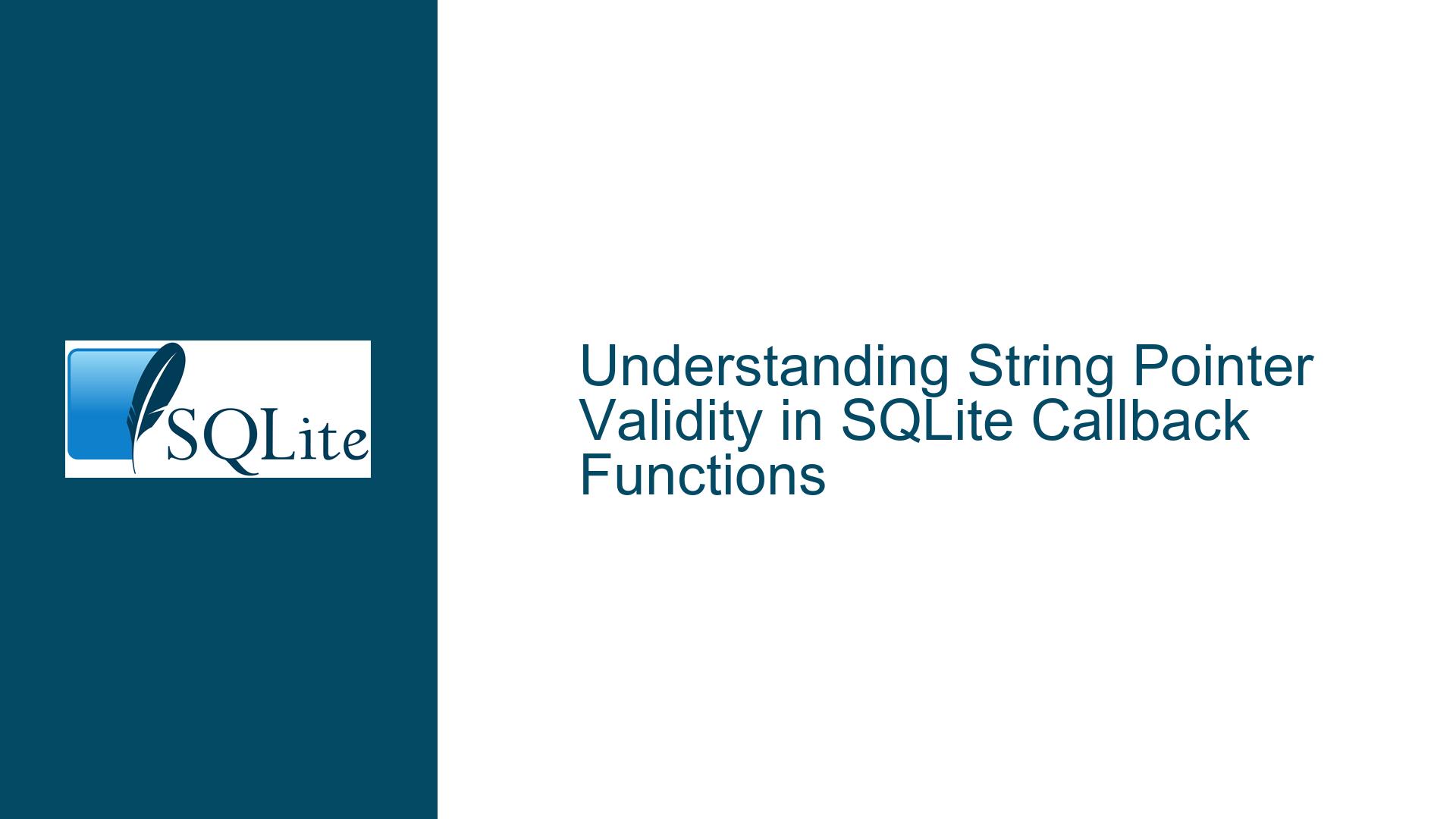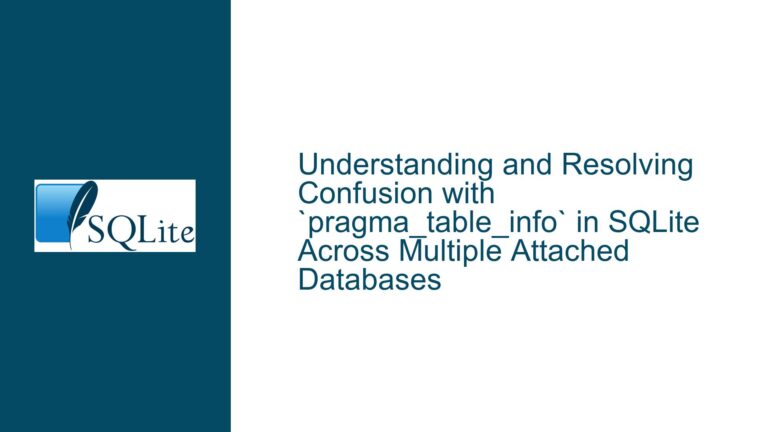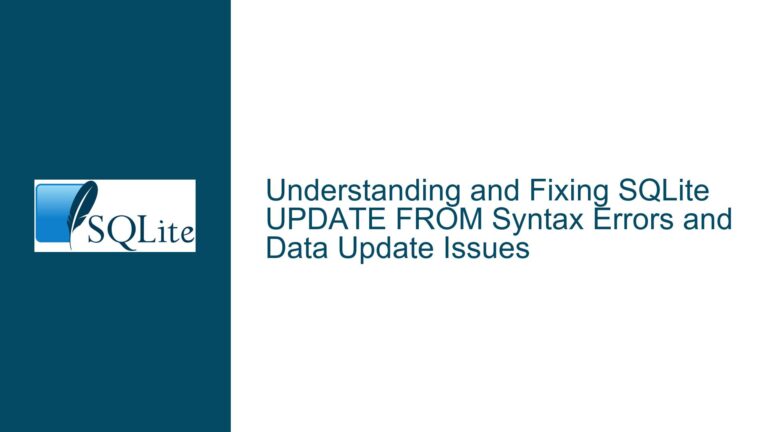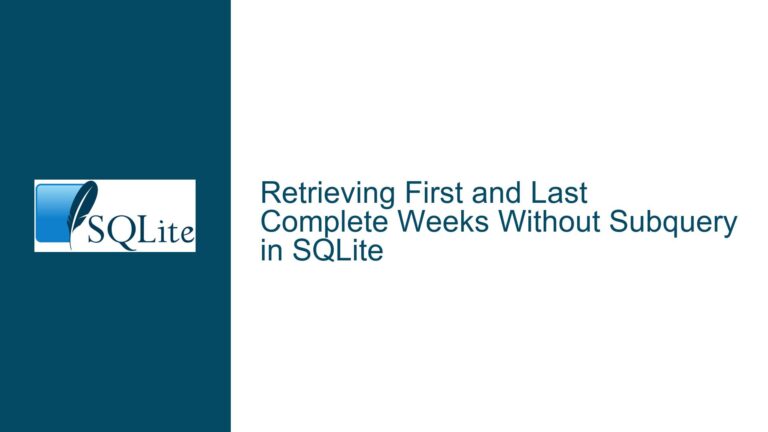String Pointer Validity in SQLite Callback Functions
Memory Lifetime of Column Value Strings in sqlite3_exec() Callbacks
The behavior of memory management in SQLite’s C/C++ API is a critical consideration when working with query results, particularly when using the sqlite3_exec() function. A common point of confusion arises from the lifetime of string pointers passed to the callback function invoked by sqlite3_exec(). Specifically, developers often question whether the char* values representing column data can be stored for use beyond the immediate execution of the callback. This issue is not merely academic; mishandling these pointers leads to undefined behavior, including crashes, data corruption, or silent memory errors. To address this, we must dissect SQLite’s memory management model, the role of the callback in query execution, and the guarantees (or lack thereof) provided by the API.
SQLite’s Memory Management and Callback Scope
SQLite manages memory allocation and deallocation internally, with strict rules governing the lifetime of buffers returned to the caller. When sqlite3_exec() is invoked, it executes the provided SQL statement and calls a user-defined callback function for each row in the result set. The callback receives an array of char** values (the third argument), where each element points to a string representation of a column’s value. A fundamental misunderstanding occurs when developers assume these pointers remain valid after the callback returns. This assumption is incorrect: the memory backing these strings is owned by SQLite and may be reused or freed immediately after the callback completes.
The API does not guarantee that these pointers will remain valid because SQLite optimizes for performance and memory efficiency. Reusing buffers across rows avoids the overhead of repeated allocations and deallocations. For example, if a query returns 10,000 rows, reusing a single buffer for string data reduces memory fragmentation and allocation costs. However, this optimization shifts responsibility to the developer to copy data if persistence is required.
The problem is exacerbated by variations in build configurations. SQLite can be compiled with different memory management strategies, such as the "transient" versus "stable" flag for certain functions. If the SQLITE_TRANSIENT macro is not used appropriately when binding values, similar lifetime issues arise. While sqlite3_exec() abstracts some of this complexity, the core issue remains: the callback’s string arguments are ephemeral.
Mechanisms Leading to Pointer Invalidation
Three primary mechanisms cause the invalidation of string pointers passed to the callback:
Buffer Reuse During Query Execution:
SQLite employs a single buffer for string representations of column values when possible. As the query processor advances to subsequent rows, this buffer is overwritten. For instance, consider a query yielding two rows:("Alice", 30)and("Bob", 25). Thechar*pointing to "Alice" may reference the same memory location later overwritten with "Bob" once the callback for the first row returns. Storing the pointer to "Alice" and accessing it after the second callback invocation would thus retrieve "Bob" or garbage data.Deallocation of Prepared Statement Memory:
Under the hood,sqlite3_exec()wraps the creation and destruction of a prepared statement. When the query completes, the prepared statement is finalized, triggering the release of all associated memory. If the callback’s string pointers are tied to this memory (as in the case of static strings or cached values), they become dangling pointers post-finalization.Type-Specific Memory Handling:
Columns storing BLOB data or strings in non-UTF8 encodings may utilize temporary buffers that are conditionally managed. For example, a column defined asTEXTbut holding an integer might return a string viasqlite3_snprintf(), which uses a static buffer. Subsequent conversions overwrite this buffer, invalidating earlier pointers.
These mechanisms underscore the non-ownership model of the callback’s string arguments. The developer is merely granted transient access to the data, with no rights to its longevity.
Strategies for Safe Data Retention and Mitigation
To safely retain column values beyond the callback’s execution, developers must create independent copies of the data. This involves allocating new memory, copying the contents of the char* arguments, and managing the lifecycle of these copies. Below are detailed strategies:
1. Deep Copying with Standard Library Functions
Use strdup() (or _strdup() on Windows) to duplicate strings:
void callback(void* user_data, int argc, char** argv, char** col_names) {
char** stored_values = (char**)user_data;
for (int i = 0; i < argc; i++) {
stored_values[i] = argv[i] ? strdup(argv[i]) : NULL;
}
}
Critical Considerations:
- Check for
NULLpointers (e.g., forNULLcolumn values) to avoid dereferencing errors. - Ensure proper deallocation with
free()for each copied string to prevent memory leaks. - Handle out-of-memory conditions:
strdup()returnsNULLon failure, which must be gracefully managed.
2. Leveraging SQLite’s Memory Management
SQLite provides sqlite3_mprintf(), which allocates memory using SQLite’s internal allocator. This is advantageous when interacting with other SQLite APIs that expect memory managed by the same allocator (e.g., sqlite3_free()):
char* copy = sqlite3_mprintf("%s", argv[i]);
Benefits:
- Compatibility with SQLite’s memory tracking and debugging facilities.
- Reduced risk of allocator mismatches in complex applications.
3. Encoding-Aware Copying
If the database uses a non-UTF8 encoding (e.g., UTF-16), ensure copies respect the encoding. SQLite’s sqlite3_column_text16() function returns const void* for UTF-16 strings, which requires using wcsdup() on platforms that support it:
wchar_t* copy = wcsdup((const wchar_t*)argv[i]);
Note: This approach assumes the callback is using a wide-character variant, which sqlite3_exec() does not directly support. Developers typically encounter encoding issues when using lower-level APIs like sqlite3_step().
4. Alternative Query Execution Models
Avoid sqlite3_exec() altogether in favor of prepared statements (sqlite3_prepare_v2(), sqlite3_step(), sqlite3_finalize()). This provides explicit control over data extraction:
sqlite3_stmt* stmt;
sqlite3_prepare_v2(db, "SELECT name, age FROM users;", -1, &stmt, NULL);
while (sqlite3_step(stmt) == SQLITE_ROW) {
const char* name = (const char*)sqlite3_column_text(stmt, 0);
int age = sqlite3_column_int(stmt, 1);
// Copy 'name' if needed
}
sqlite3_finalize(stmt);
Advantages:
- Column data remains valid until the statement is finalized or the next call to
sqlite3_step(). - Direct access to typed data (e.g., integers, BLOBs) without string conversions.
5. Custom Memory Management Abstraction
For large-scale applications, implement a memory management layer that tracks copied strings and ensures their deallocation. This could involve:
- A linked list of copied strings attached to a user-supplied
void*context. - RAII (Resource Acquisition Is Initialization) patterns in C++ wrappers.
Example:
typedef struct {
char** entries;
size_t count;
} StringCache;
void cache_string(StringCache* cache, const char* src) {
cache->entries = realloc(cache->entries, (cache->count + 1) * sizeof(char*));
cache->entries[cache->count++] = strdup(src);
}
// Post-processing: iterate over 'entries' and free each string.
6. Documentation-Centric Validation
Always consult the official SQLite documentation for API contracts. The documentation for sqlite3_exec() explicitly warns that the callback’s arguments are ephemeral:
"The third argument to the callback function is an array of pointers to strings obtained as if from
sqlite3_column_text(), one for each column. The strings are transient and may be invalidated after the callback returns."
Reinforcing this through code reviews and static analysis tools prevents regressions.
By internalizing SQLite’s memory ownership rules and adopting rigorous copying practices, developers avoid the pitfalls of dangling pointers. The key takeaway is unambiguous: any pointer provided by SQLite via a callback is a loan, not a gift. Treating it as such ensures robust, crash-free applications.






